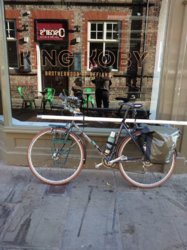We work inside the bar walls, I cycle in but as a business we need vehicles to pick up broken down motorcycles etc,
York Council seem to be hell bent on stripping any business that is not a Coffee Shop, Pub or Hotel out of the Centre.
That's why they are talking about removing private cars, not all vehicles. Your business would actually benefit because when you had to do a pickup you wouldn't get stuck behind half a dozen lost tourists in hire cars.
What does one bloke driving a vintage Mustang once a month, in summer, make? I do hope the rules are sensible.
Why do you need to drive through central York? Arguably, if you only drive there about six times a year, then it isn't an essential journey.
The one issue with the York proposal is that it presumably takes all such vehicles off Station Road beyond the railway station so taking away a crossing of the Ouse hence forcing traffic on the north side of the city centre either further out to Clifton or to the south on Skeldergate Bridge near Clifford's Tower. Both potentially cause serious congestion issues on top of the existing in those locations. Or is the banning of such vehicles from within the city walls a headline that the details will show something different?
This comes under Induced Demand, the observed phenomenon that (applied to this situation) as more space is given to private cars, more journeys are made by private car, so you end up with a vicious cycle, or as one planner put it: "You sow roads, you reap traffic".
It is gradually being recognised, in the face of much screaming from the car lobby, that the reverse, called Reduced Demand, is also true, and the best way to reduce congestion is to reduce the space given to cars, or make it more expensive to use. When this happens people reduce the number of journeys made by car and switch to other forms of transport.
York is my home. Clean air strategy is more complex than banning traffic. We are fast becoming a theme park, and the local authority allows itself to be seduced by developers who steadily turn this historic place into a coffee-drowned budget hotel room.
Air quality is worst at taxi ranks and bus stops.
The peripheral roads to go round the city north to south by car are choked.
A tourist levy should be introduced to help fund clean taxis, buses and to encourage sustainable local trade back into the city centre.
We have those in some places in Germany. The Black Forest levy costs about two euro and includes a train ticket for the entire Black Forest, which saved me about fifteen euro last time I was there. A levy in York that gives free use of the buses would be a great way to back up the ban on cars.
Incidentally, whenever a city has banned or reduced private cars in their centre they've found that local businesses profit because it is more pleasant for people to visit, so they have increased footfall, and those people stay longer and spend more.
Stop talking common sense, all the Tourists and Hen Parties will love it, why take York residents into account

.
In practice people living within the city walls will most likely have an exemption: that's how we regulate this locally. This means that residents have the best of both worlds: they live in a city with low congestion, that is easy to get around without a car, but they still can use their car when they need it and won't get clogged up by tourists pootling about.
The car lobby uses the idea of a blanket ban as a bogeyman to get people to vote against it because they think, probably correctly, that once these things become successful it will be the beginning of the end of unfettered car use in the UK and Europe. Once one city manages to push this plan through and it is clearly successful, others will follow.
It is also noticeable here that whenever a city plans a 'car free' neighbourhood where a condition of moving there is to not own a car, there's usually a waiting list a mile long.
The basic problem facing local governments is that by definition everything you do which helps motorised traffic hinders pedestrians and residents, and vice versa. Therefore we can make towns and cities suitable for cars, or we can make them pleasant places to live and work: we can't have both.


